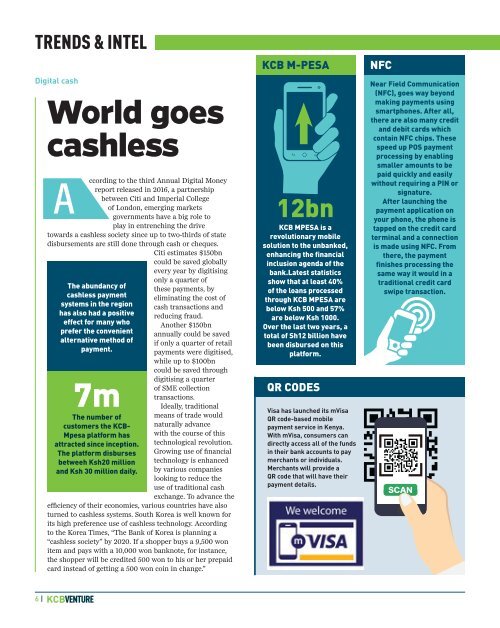You also want an ePaper? Increase the reach of your titles
YUMPU automatically turns print PDFs into web optimized ePapers that Google loves.
TRENDS & INTEL<br />
Digital cash<br />
World goes<br />
cashless<br />
A<br />
ccording to the third Annual Digital Money<br />
report released in 2016, a partnership<br />
between Citi and Imperial College<br />
of London, emerging markets<br />
governments have a big role to<br />
play in entrenching the drive<br />
towards a cashless society since up to two-thirds of state<br />
disbursements are still done through cash or cheques.<br />
Citi estimates $150bn<br />
could be saved globally<br />
every year by digitising<br />
The abundancy of<br />
cashless payment<br />
systems in the region<br />
has also had a positive<br />
effect for many who<br />
prefer the convenient<br />
alternative method of<br />
payment.<br />
7m<br />
The number of<br />
customers the <strong>KCB</strong>-<br />
Mpesa platform has<br />
attracted since inception.<br />
The platform disburses<br />
betweeh Ksh20 million<br />
and Ksh 30 million daily.<br />
only a quarter of<br />
these payments, by<br />
eliminating the cost of<br />
cash transactions and<br />
reducing fraud.<br />
Another $150bn<br />
annually could be saved<br />
if only a quarter of retail<br />
payments were digitised,<br />
while up to $100bn<br />
could be saved through<br />
digitising a quarter<br />
of SME collection<br />
transactions.<br />
Ideally, traditional<br />
means of trade would<br />
naturally advance<br />
with the course of this<br />
technological revolution.<br />
Growing use of financial<br />
technology is enhanced<br />
by various companies<br />
looking to reduce the<br />
use of traditional cash<br />
exchange. To advance the<br />
efficiency of their economies, various countries have also<br />
turned to cashless systems. South Korea is well known for<br />
its high preference use of cashless technology. According<br />
to the Korea Times, “The Bank of Korea is planning a<br />
“cashless society” by 2020. If a shopper buys a 9,500 won<br />
item and pays with a 10,000 won banknote, for instance,<br />
the shopper will be credited 500 won to his or her prepaid<br />
card instead of getting a 500 won coin in change.”<br />
<strong>KCB</strong> M-PESA<br />
12bn<br />
<strong>KCB</strong> MPESA is a<br />
revolutionary mobile<br />
solution to the unbanked,<br />
enhancing the financial<br />
inclusion agenda of the<br />
bank.Latest statistics<br />
show that at least 40%<br />
of the loans processed<br />
through <strong>KCB</strong> MPESA are<br />
below Ksh 500 and 57%<br />
are below Ksh 1000.<br />
Over the last two years, a<br />
total of Sh12 billion have<br />
been disbursed on this<br />
platform.<br />
QR CODES<br />
Visa has launched its mVisa<br />
QR code-based mobile<br />
payment service in Kenya.<br />
With mVisa, consumers can<br />
directly access all of the funds<br />
in their bank accounts to pay<br />
merchants or individuals.<br />
Merchants will provide a<br />
QR code that will have their<br />
payment details.<br />
NFC<br />
Near Field Communication<br />
(NFC), goes way beyond<br />
making payments using<br />
smartphones. After all,<br />
there are also many credit<br />
and debit cards which<br />
contain NFC chips. These<br />
speed up POS payment<br />
processing by enabling<br />
smaller amounts to be<br />
paid quickly and easily<br />
without requiring a PIN or<br />
signature.<br />
After launching the<br />
payment application on<br />
your phone, the phone is<br />
tapped on the credit card<br />
terminal and a connection<br />
is made using NFC. From<br />
there, the payment<br />
finishes processing the<br />
same way it would in a<br />
traditional credit card<br />
swipe transaction.<br />
6 |


